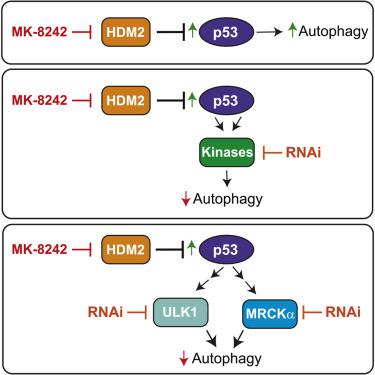iScience ( IF 4.6 ) Pub Date : 2019-04-23 , DOI: 10.1016/j.isci.2019.04.023 Stephanie L. Celano , Lisette P. Yco , Matthew G. Kortus , Abigail R. Solitro , Hakan Gunaydin , Mark Scott , Edward Spooner , Ronan C. O'Hagan , Peter Fuller , Katie R. Martin , Stuart D. Shumway , Jeffrey P. MacKeigan

|
In cancer, autophagy is upregulated to promote cell survival and tumor growth during times of nutrient stress and can confer resistance to drug treatments. Several major signaling networks control autophagy induction, including the p53 tumor suppressor pathway. In response to DNA damage and other cellular stresses, p53 is stabilized and activated, while HDM2 binds to and ubiquitinates p53 for proteasome degradation. Thus blocking the HDM2-p53 interaction is a promising therapeutic strategy in cancer; however, the potential survival advantage conferred by autophagy induction may limit therapeutic efficacy. In this study, we leveraged an HDM2 inhibitor to identify kinases required for p53-dependent autophagy. Interestingly, we discovered that p53-dependent autophagy requires several kinases, including the myotonic dystrophy protein kinase-like alpha (MRCKα). MRCKα is a CDC42 effector reported to activate actin-myosin cytoskeletal reorganization. Overall, this study provides evidence linking MRCKα to autophagy and reveals additional insights into the role of kinases in p53-dependent autophagy.
中文翻译:

鉴定负责p53依赖性自噬的激酶
在癌症中,自噬被上调以在营养胁迫时期促进细胞存活和肿瘤生长,并可能赋予对药物治疗的抵抗力。几个主要的信号网络控制自噬诱导,包括p53肿瘤抑制途径。响应DNA损伤和其他细胞应激,p53稳定并被激活,而HDM2结合并泛素化p53用于蛋白酶体降解。因此,阻断HDM2-p53相互作用是一种有前途的癌症治疗策略。但是,自噬诱导所带来的潜在生存优势可能会限制治疗效果。在这项研究中,我们利用HDM2抑制剂来鉴定p53依赖自噬所需的激酶。有趣的是,我们发现p53依赖的自噬需要几种激酶,包括肌强直性营养不良蛋白激酶样α(MRCKα)。MRCKα是CDC42效应物,据报道可激活肌动蛋白-肌球蛋白细胞骨架重组。总的来说,这项研究提供了将MRCKα与自噬联系起来的证据,并揭示了激酶在p53依赖性自噬中的作用的其他见解。































 京公网安备 11010802027423号
京公网安备 11010802027423号